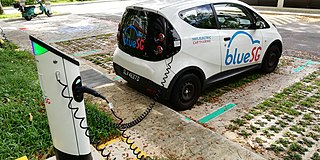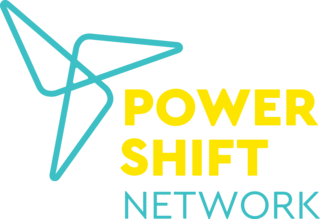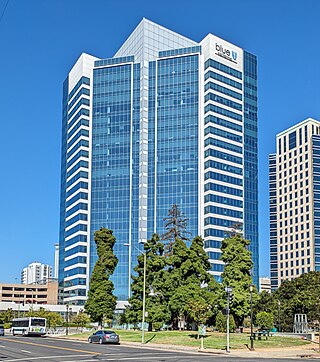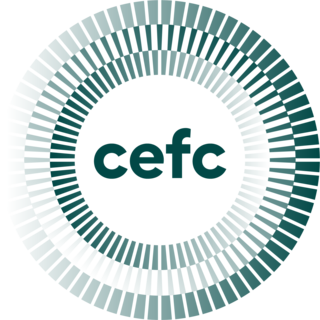
Clean technology, also called cleantech or climatetech, is any process, product, or service that reduces negative environmental impacts through significant energy efficiency improvements, the sustainable use of resources, or environmental protection activities. Clean technology includes a broad range of technology related to recycling, renewable energy, information technology, green transportation, electric motors, green chemistry, lighting, grey water, and more. Environmental finance is a method by which new clean technology projects can obtain financing through the generation of carbon credits. A project that is developed with concern for climate change mitigation is also known as a carbon project.

The Alliance to Save Energy is a bipartisan, nonprofit coalition of business, government, environmental, and consumer groups based in Washington, D.C. The Alliance states that it advocates for "energy-efficiency policies that minimize costs to society and individual consumers, and that lessen greenhouse gas emissions and their impact on the global climate." The Alliance's chief activities include public relations, research, and lobbying to change U.S. energy policy.
The Climate Investment Funds (CIF) were established in 2008 as a multilateral climate fund in order to finance pilot projects in developing countries at the request of the G8 and G20. The CIF administers a collection of programs with a view of helping nations fight the impacts of climate change and accelerate their shift to a low-carbon economy.

Power Shift Network is a North American non-profit organization made up of a network of youth-led social and environmental justice organizations working together to build the youth clean energy and climate movement. It runs campaigns in the United States and Canada to build grassroots power and advocate for tangible changes on climate change and social justice at local, state, national and international levels in North America. The organization changed its name from Energy Action Coalition in July 2016 in order to reflect its new leadership and it shift from a coalition to a network structure. The Power Shift Network's members, which include other non-profit organizations and student groups focused on environmental justice, social justice, and climate change, focus their organizing and campaigns on campuses, communities, corporate practices, and politics. The Power Shift Network is part of the Global Youth Climate Movement.

Philip David Radford is an American environmental leader serving as Chief Strategy Officer of the Sierra Club, and who served as the executive director of Greenpeace USA. He was the founder and President of Progressive Power Lab, an organization that incubates companies and non-profits that build capacity for progressive organizations, including a donor advisory organization Champion.us, the Progressive Multiplier Fund and Membership Drive. Radford is a co-founder of the Democracy Initiative, was founder and executive director of Power Shift, and is a board member of the Mertz Gilmore Foundation. He has a background in grassroots organizing, corporate social responsibility, climate change, and clean energy.
A Green bond is a fixed-income financial instruments (bond) which is used to fund projects that have positive environmental and/or climate benefits. They follow the Green Bond Principles stated by the International Capital Market Association (ICMA), and the proceeds from the issuance of which are to be used for the pre-specified types of projects.

Tom Cotter (born June 29, 1972) is an American conservationist, entrepreneur, renewable energy advocate, and ordained evangelical minister living in Clovis, California.

Michael Liebreich is Chairman and CEO of Liebreich Associates, through which he provides advisory services and speaks on clean energy and transportation, smart infrastructure, technology, climate finance and sustainable development. In September 2020, he became an official adviser to the UK’s Board of Trade. He is also a senior contributor at Bloomberg New Energy Finance, a company he founded in 2004 that was acquired by Bloomberg L.P. in 2009. In July 2020, he launched his weekly podcast Cleaning Up. Guests are leaders in clean energy, mobility, climate finance or sustainable development, and have included Tony Blair and Ban Ki-moon. In March 2021, Michael became a Co-Founding and Managing Partner of EcoPragma Capital LLP. EcoPragma is a Growth Equity investor, investing in companies on the cusp of strong commercial growth and contributing to the net-zero transition In November 2022, Michael was awarded an Honorary Fellowship from the Energy Institute for being one of the foremost thought leaders in renewable energy and sustainability, not just in the UK, but globally.

Gregory H. Kats is an American businessman, environmentalist, and thought leader in the green economy sector. He is founder and CEO of the Smart Surfaces Coalition, a non-profit organization consisting of 40+ national and international partner groups working to ensure the rapid, cost-effective adoption of reflective, porous, and green urban surface infrastructure, or "smart surfaces", in cities. Previously, Kats served as a Managing Director at Good Energies,[2] a multi-billion dollar global clean energy investor, and Director of Financing for Energy Efficiency and Renewable Energy at the U.S. Department of Energy (DOE).[3]
GoodLeap, formerly Loanpal, is a finance technology company headquartered in San Francisco, that provides financing options for the residential solar energy industry.
Clean Power Finance, headquartered in San Francisco, California, is a financial services and software company for the residential solar industry.
Danny Kennedy is an American clean-technology entrepreneur, environmental activist, and the author of the book Rooftop Revolution: How Solar Power Can Save Our Economy—and Our Planet—from Dirty Energy (2012). Kennedy is managing director of the California Clean Energy Fund, a non-profit dedicated to optimizing the clean energy transition. He co-founded Sungevity, a residential solar power company, and Powerhouse, the primer solar incubator in Oakland. While at Sungevity, Kennedy won a Planet Forward Innovator of the Year award from the PBS program Planet Forward.

Solar Mosaic is a clean energy fin-tech company based in Oakland, California. Founded in 2010, Mosaic created its initial business model using crowdfunding principals to offer loans for commercial solar development projects. After shifting its model in 2014, Mosaic is now focused on financing residential solar projects by leveraging third party capital partners. Through this model, the company aims to democratize the social and environmental benefits of clean energy.
James Eugene Rogers Jr. was an American businessman and author. He was president and CEO of Duke Energy, the largest electrical utility in the U.S., from April, 2006 until July 1, 2013. He stayed on as Chairman of the Board until retiring the following December. His book, Lighting the World, which explores the issues involved in bringing electricity to over 1.2 billion people on earth who lack it, was published August 25, 2015, by St. Martin's Press. The book asserts that access to electricity should be recognized as a basic human right.

The Clean Energy Finance Corporation (CEFC) is an Australian Government-owned green bank that invests in clean energy, to help achieve Australia's national goal of net zero emissions by 2050. The CEFC invests billions of dollars on behalf of the Australian Government in economy-wide decarbonisation opportunities. It aims to help transform the Australian energy grid, as well as supporting sustainable housing initiatives, and climate tech innovators.

Sumant Sinha is an Indian businessman. He is the Founder, Chairman and CEO of ReNew, a renewable energy company and the first Indian renewable energy company to list on Nasdaq. A first-generation entrepreneur, Sumant founded ReNew in 2011.

The Council on Energy, Environment and Water, commonly known as CEEW, is a Not-For profit Think Tank and policy institution based in New Delhi, India. CEEW was formed to provide independent research-based insights to policymakers for building a sustainable India. The Council also has an office in Lucknow, Uttar Pradesh. It has multiple research projects running across 22 Indian states and other parts of the world.
Thomas Linn Dinwoodie is a cleantech entrepreneur, inventor, and founder of SunPower Corporation Systems. He holds a long-standing interest in accelerating the transition to clean energy and other climate-sustaining practices. Dinwoodie is also an architect.

A green bank is a financial institution, typically public or quasi-public, that employs innovative financing techniques and market development tools in collaboration with the private sector to expedite the deployment of clean energy technologies. Green banks use public funds to leverage private investment in clean energy technologies that, despite their commercial viability, have struggled to establish a widespread presence in consumer markets. Green banks aim to reduce energy costs for ratepayers, stimulate private sector investment and economic activity, and expedite the transition to a low-carbon economy.
Trenton Allen is an American investment banker focused on sustainable projects and a member of the Secretary of Energy Advisory Board for the U.S. Department of Energy. He is the CEO and Managing Director of Sustainable Capital Advisors (SCA). Allen led one of the first "green bond" issuances with an Energy Efficiency Revenue Bond financing the Delaware Sustainable Energy Utility.












